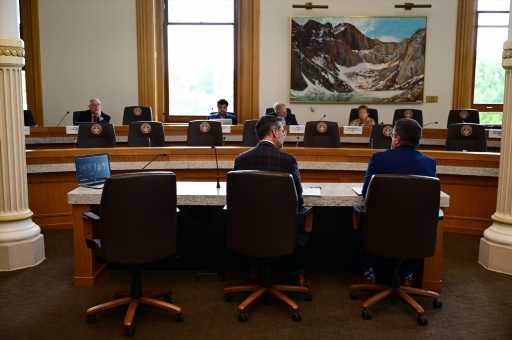Colorado judge targeted for work on judicial reform, attorney claims
A Colorado judge cried foul this week after he was admonished by the leader of the state office that disciplines attorneys for professional misconduct, while the leader defended her actions.
El Paso County District Court Judge David Prince was reprimanded not because of actual wrongdoing but because he is a member of the Commission on Judicial Discipline, the group responsible for disciplining the state’s judges, Prince’s attorney David Kaplan claimed in a letter last week.
But Attorney Regulation Counsel Jessica Yates, who sent the critical letter to Prince, said she was simply acting on her professional responsibilities.
“Despite all my privilege and all my ability to fight… when I received that letter, my wife is in tears for a couple of nights, my blood pressure hit a 15-year high,” Prince told the House Judiciary Committee in a hearing at the state Capitol on Wednesday. “…I feared for my career. I effectively have to give up what were my plans for retirement because of the way things have gone because we came forward and testified. And it wasn’t just me, it was every lawyer on the commission (received the letter).”
The dispute is the latest turn in a simmering fight between the Colorado Commission on Judicial Discipline and the Colorado Supreme Court amid an effort by lawmakers to reform the state’s system for disciplining judges in the wake of a blackmail scandal that came to light in 2021. Prince made his public comments during a discussion of three judicial reform bills, each of which passed unanimously out of the committee Wednesday.
In February, Prince, who is vice chair of the Commission on Judicial Discipline, testified to lawmakers about the commission’s working relationship with the Office of Attorney Regulation Counsel. Yates took issue with Prince’s testimony and on Feb. 6 sent a letter to Prince and the other members of the commission in which she accused Prince of making false statements, and said he and the commission’s members may have violated the rules of professional conduct for attorneys.
The Office of Attorney Regulation Counsel, which Yates leads, is responsible for investigating any such professional conduct violations, which can result in an attorney being disciplined, suspended or disbarred.
In the Feb. 6 letter, Yates said she was not pursuing a formal investigation against Prince but was instead reaching out, one attorney to another, to encourage Prince to “better conform future conduct” to the rules of professional behavior.
But Kaplan wrote in a March 8 response to Yates that her admonishment, which was delivered on official letterhead, was “intimidating,” would have a “terrible chilling effect” on future testimony from attorneys, and might violate a state law that prohibits retaliation against people who testify at the capitol.
Prince did not return a request for comment Thursday and Kaplan declined to comment.
Yates accused Prince of lying about the Office of Attorney Regulation Counsel’s level of cooperation with the Commission on Judicial Discipline when he described problems the commission members were having with the agency. Kaplan maintains Prince’s comments were true.
Yates, who also sent a March 9 letter to lawmakers outlining her concerns with Prince’s testimony, said in an interview Thursday that she did not intend the letters as intimidation. Kaplan’s concerns were “overblown,” she said.
“I really had been operating on the good faith belief that we all share a common goal of providing accurate information to the legislature,” Yates said. “They interpreted it differently. If they feel intimidated, then I regret that consequence. But I hope that we can all continue to have that shared common goal of providing accurate information to the legislature.”
She acknowledged that a letter from her, as head of the Office of Attorney Regulation Counsel, or OARC, holds more weight than a letter from a private attorney, but said she made it clear the letter was not an official action by the office.
“OARC was never working on it,” she said. “There was no pending matter in our office. So for my purposes, the matter is closed.”
As attorney regulation counsel, Yates serves at the pleasure of the Colorado Supreme Court justices — she was hired by them and could be fired by them — but the office operates independently from the Supreme Court and the judicial department, she said. The justices did not instruct her to send the letter and she did not seek their permission to do so, she said.
“I did it completely on my own volition,” she said. “We are an independent office. I don’t take direction from the Supreme Court or the State Court Administrator’s Office.”
Jon Sarché, spokesman for the Colorado Judicial Department, reiterated that in a statement Thursday.
“The Supreme Court is not involved in the decision-making of attorney regulation counsel in individual cases, was not involved in the matters or discussions referenced in the letter, and was not involved in the decision to send the letter,” he said.
During Wednesday’s committee testimony, Prince discussed the stress he and other commission members have been under as they’ve at times been pitted against the Colorado Supreme Court and the Colorado Judicial Department during the reform process.
“We know it’s an incredibly important task and an incredibly difficult one, because you are dealing with holding accountable the most powerful people and privileged people in our society: judges,” he said. “You know it’s going to be difficult when you go in, but you have no idea that you’re going to be under this constant onslaught that we have been under the past two years.”
He tied the admonishment against him to the felony criminal charge brought against now-former state Sen. Pete Lee, D-Colorado Springs, who had been leading the judicial reform effort when he was indicted on a felony charge because of false information the Office of Attorney Regulation Counsel gave the Fourth Judicial District Attorney’s Office. Lee, who was term-limited, resigned from the reform committee, and the charge against him was later dropped.
Lee declined to discuss the dropped case against him Thursday but said the letter Prince received appears to “have the effect of intimidating him from expressing his beliefs.”
“Prince may view it as intimidation, I may view it as intimidation, in fact, any lawyer is going to have to think twice before going to a House or Senate committee for fear of being charged with a violation of the code of professional conduct,” Lee said Thursday.
Prince told lawmakers Wednesday that he’s received support from judges and attorneys for judicial reform, but that many people appear hesitant to voice their support publicly for fear of professional retaliation.
“People come up to me, people say, ‘Thank you for what you are doing,’” he said. “What shocks me is the number of people who do that who are judges. At the judicial conference, I couldn’t go anywhere… without judges coming up and saying that. But it was always in a quiet hallway, near a dark corner, in a whispered voice.”
Stay up-to-date with Colorado Politics by signing up for our weekly newsletter, The Spot.
Source: Read Full Article


